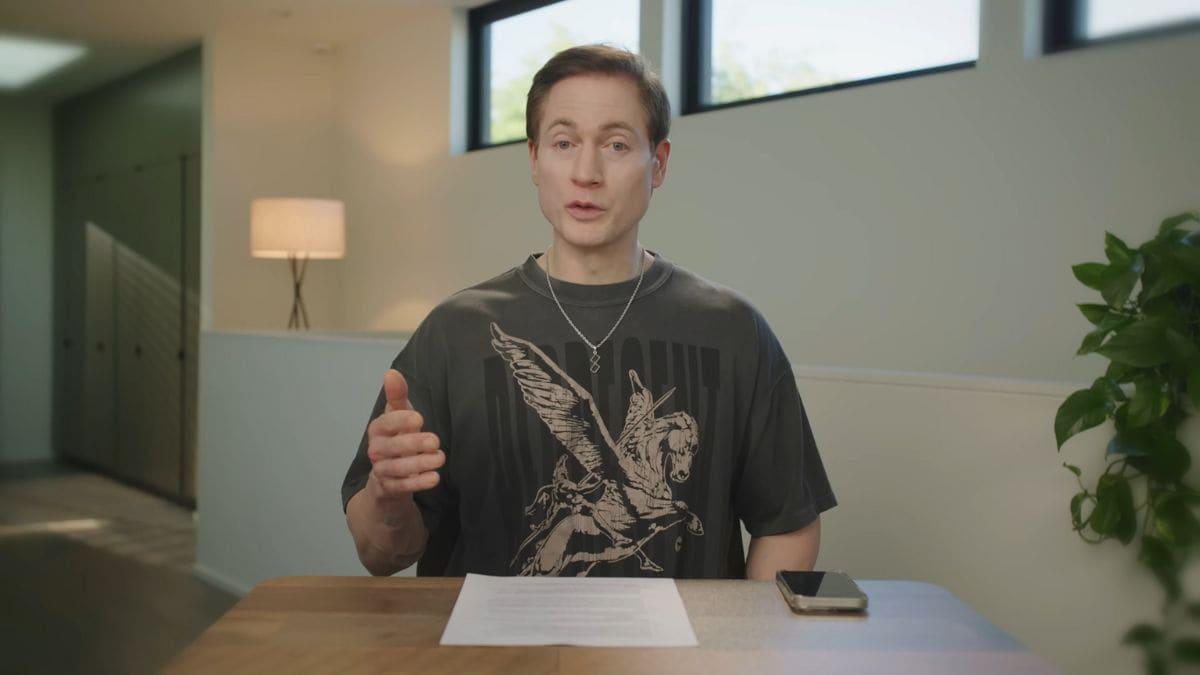Tech Entrepreneur Bryan Johnson's Ambitious AI-Driven Quest for Immortality
2 Sources
2 Sources
[1]
Bryan Johnson's Key to Live Forever Lies in AI Tech: Report
The entrepreneur is the CEO of anti-ageing startup Blueprint Bryan Johnson, the CEO of anti-ageing company Blueprint, reportedly said that his vision of living forever goes through artificial intelligence (AI). In an interview, the tech entrepreneur who has invested millions of dollars and multiple years to reverse his ageing in efforts to increase longevity of life, highlighted that he was now shifting his focus from reducing ageing to not dying. For this, Johnson has reportedly created an AI system which knows everything about the entrepreneur. Obsessing over immortality is not a new thing for the entrepreneur turned influencer, who is known for following a very strict lifestyle and diet to not only reduce ageing but to reverse it. In an interview with Wired, Johnson opened up about his current focus on eternal existence, and how he was going to achieve that. Johnson reportedly said that he is focused on "extending our lifespans to some unknown horizon." He reportedly added that to achieve this, humans will have to move on from the current biological system (which is made up of the human body, including bones, muscles, and blood) to a computational system. To that end, the entrepreneur has created an AI system that he calls Bryan AI, the publication mentioned. While it is said to be in a very crude form, Johnson has fed the machine with every word that he has ever said. In essence, Bryan AI was trained on the dataset of Johnson's entire life experience, thoughts, and personality. By taking in this information, Johnson likely believes that Bryan AI would become, with the progression of AI technology, a digital replica of himself. Fans of the popular British show Black Mirror would remember this concept from the episodes Be Right Back and San Junipero. While the aspiration itself is achievable on paper, in practicality, it comes across several technological hurdles. First, large language models (LLMs), can be trained on datasets, but they do not necessarily remember the data in the same form that they ingest it. This data is broken down to sub-sentence level and is tokenised. Then it is fed to the AI system. So, even if the system takes in all the data, when it reproduces it, that may not be similar to the persona of Johnson. The AI system can still be trained on the entrepreneur's personality during pre- and post-training processes. However, such complicated techniques to create an AI model in resemblance to another human to the point they embody their entire personality have not yet been done. There is a third option: A persona can be created after the AI model and its frontend chatbot have been created. This is similar to the Meta AI personas, Gemini's Gems, or OpenAI's GPTs. But that version would be a very superficial integration of a person, as we have seen from numerous Character.ai chatbots. As per the Wired interview, Johnson does acknowledge that technology is not at the point where he can embed his brain and personality onto an AI system; however, he says, "As the technology gets better and better, the most prized asset is going to be existence." Interestingly, and perhaps somewhat related, the entrepreneur is also planning to sell his anti-ageing startup to focus on a new philosophical path and religion dubbed "Don't Die."
[2]
Will Bryan Johnson never die? Here's all about tech entrepreneur's tall claim, Bryan AI and Project Blueprint
Will Bryan Johnson never die? The founder of Braintree and Kernel has made a bold statement about his future. In a recent WIRED interview, Johnson said he does not believe he will die. This statement is not based on belief alone but on scientific projects he is funding and leading. His work combines artificial intelligence, biology, and neuroscience to develop a new understanding of life and consciousness. Johnson believes that human identity can move beyond biology. He is developing Bryan AI, a digital version of himself. This system is being trained using thousands of hours of his recorded conversations, writings, interviews, and thoughts. According to Johnson, Bryan AI will: This project reflects Johnson's idea that a person's consciousness can live beyond the body. He sees Bryan AI as a second version of himself, stored digitally and able to evolve independently. Also Read: Bruce Willis Net Worth 2025: Who manages actor's estate? See his film earnings, endorsements, royalties and wealth Johnson's personal health project, known as Project Blueprint, costs around $2 million per year. It focuses on reversing biological aging and is supported by a large medical team. Key features of his lifestyle include: One notable act under this program included a plasma transfusion from his teenage son. The goal was to refresh his body using younger blood. Critics raised concerns, but Johnson viewed it as an experiment. According to his data, his biological age has decreased by more than five years. Johnson's view of AI is not as a tool but as a pathway to extending human life. Bryan AI represents more than a program -- it is a reflection of his own mind. His goal is to upload memory, personality, and thought into a digital system. This approach connects with a larger scientific field called mind uploading, where technology is used to preserve or replicate consciousness. Though many experts believe a digital copy cannot truly replace a human mind, Johnson disagrees. He sees brain functions as patterns that can be copied, understood, and replicated. Also Read: Bruce Willis Latest Health Update: Actor battles Frontotemporal Dementia. Here's all details about family, career, awards and net worth Johnson also leads Kernel, a neurotech company that is working on non-invasive brain mapping. Kernel's helmets are designed to: To Johnson, biology is only the beginning. He refers to it as version 1.0, while digital life is version 2.0. This belief guides his work across all projects. His long-term goal is not just to live longer but to create a new form of existence where consciousness continues through data and machines. Johnson's view redefines mortality. He sees death not as unavoidable but as a technical challenge. His work aims to make continued existence the most important asset. He believes that if consciousness can be preserved or recreated, then death becomes a problem that can be solved, not just accepted. What is Bryan AI? Bryan AI is a digital replica of Bryan Johnson's consciousness, built using AI trained on his data, aimed at preserving his identity beyond his biological body. What is Project Blueprint? Project Blueprint is Bryan Johnson's $2 million-per-year program to reverse biological aging through strict routines, advanced medical scans, and expert health monitoring.
Share
Share
Copy Link
Bryan Johnson, CEO of anti-aging startup Blueprint, is shifting his focus from reversing aging to achieving immortality through AI technology, developing a digital replica of his consciousness called Bryan AI.
Bryan Johnson's Pursuit of Digital Immortality
Tech entrepreneur Bryan Johnson, CEO of anti-aging startup Blueprint, has set his sights on a bold new frontier: achieving immortality through artificial intelligence. In a recent interview with Wired, Johnson revealed his shift from merely reversing the aging process to pursuing eternal existence
1
.
Source: Gadgets 360
The Bryan AI Project
At the heart of Johnson's ambitious plan is "Bryan AI," a digital replica of his consciousness. This AI system is being trained on an extensive dataset comprising Johnson's entire life experiences, thoughts, and personality
2
. The goal is to create a computational version of himself that can exist beyond his biological lifespan.Johnson believes that as AI technology advances, human identity can transcend biology. He envisions Bryan AI as a second version of himself, capable of independent evolution and continued existence in digital form
1
.Project Blueprint: Reversing Biological Aging
Parallel to his AI endeavors, Johnson continues his work on Project Blueprint, a $2 million per year personal health initiative aimed at reversing biological aging. This project involves:
- A strict lifestyle and diet regimen
- Advanced medical scans and monitoring
- Experimental procedures, including a controversial plasma transfusion from his teenage son
Johnson claims that his efforts have reduced his biological age by more than five years, according to his data
2
.Challenges and Criticisms
While Johnson's aspirations are technologically ambitious, they face significant hurdles. Experts point out that large language models, which form the basis of AI systems like Bryan AI, do not retain information in the same form they ingest it. This poses challenges in accurately replicating a human's persona
1
.Moreover, the concept of mind uploading – transferring human consciousness to a digital medium – remains highly controversial. Many experts argue that a digital copy cannot truly replace a human mind, though Johnson disagrees with this assessment
2
.Related Stories
Kernel and the Future of Neurotechnology

Source: ET
Johnson is also the founder of Kernel, a neurotechnology company working on non-invasive brain mapping. Their helmets are designed to measure and quantify brain activity, potentially contributing to our understanding of consciousness and cognition
2
.Redefining Mortality
Johnson's work represents a radical reimagining of human mortality. He views death not as an inevitability, but as a technical challenge to be overcome. By preserving or recreating consciousness through data and machines, Johnson aims to create a new form of existence where life continues beyond biological constraints
2
.As technology progresses, Johnson believes that "existence" itself will become the most prized asset. His work across AI, biology, and neuroscience seeks to push the boundaries of what it means to be human and to live, challenging our fundamental understanding of life and consciousness
1
.References
Summarized by
Navi
[1]
Related Stories
Anthropic CEO's Bold Claim: AI Could Double Human Lifespan Within a Decade
25 Jan 2025•Technology

Ray Dalio Unveils 'Digital Ray': An AI Clone for Investment and Life Advice
22 Oct 2025•Business and Economy

Neuralink Patient Uses Brain Implant and AI to Communicate, Raising Ethical Questions
08 May 2025•Technology

Recent Highlights
1
ByteDance's Seedance 2.0 AI video generator triggers copyright infringement battle with Hollywood
Policy and Regulation

2
Demis Hassabis predicts AGI in 5-8 years, sees new golden era transforming medicine and science
Technology

3
Nvidia and Meta forge massive chip deal as computing power demands reshape AI infrastructure
Technology





